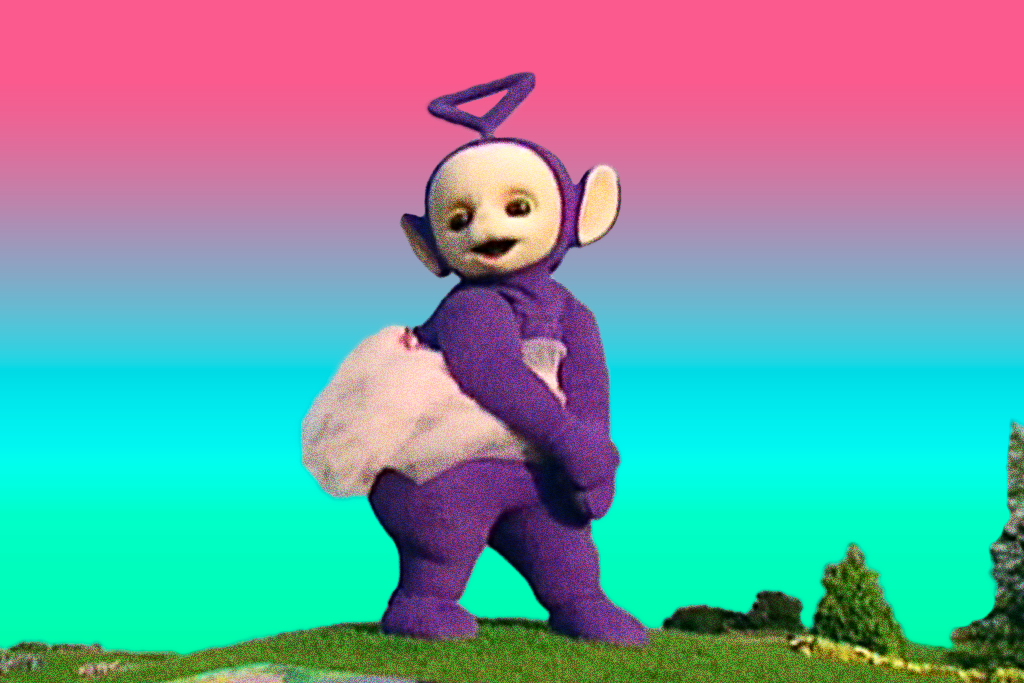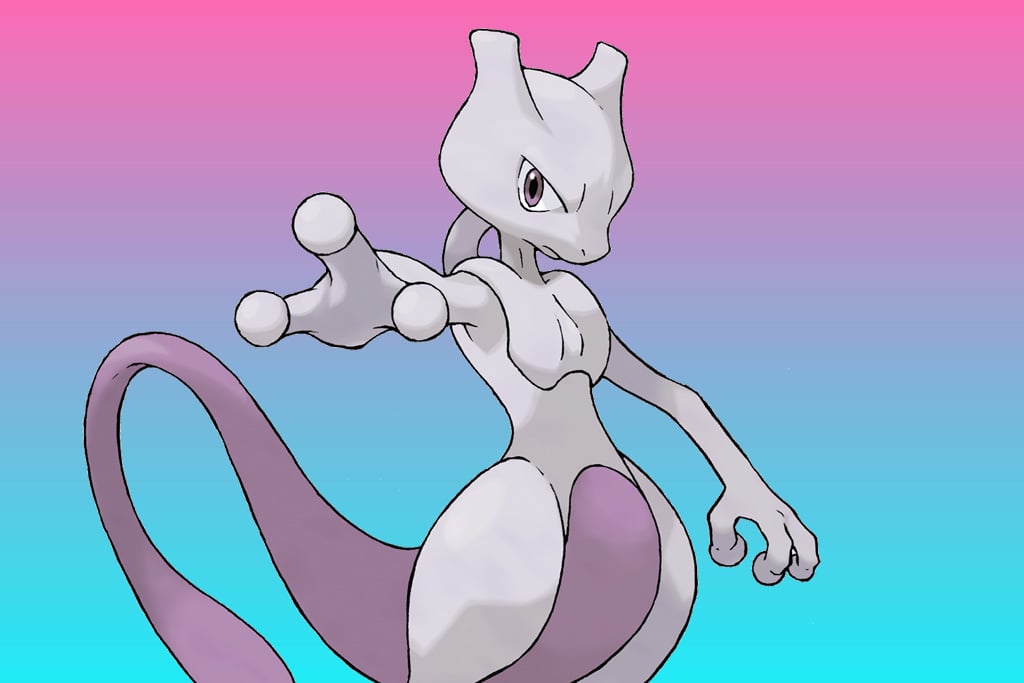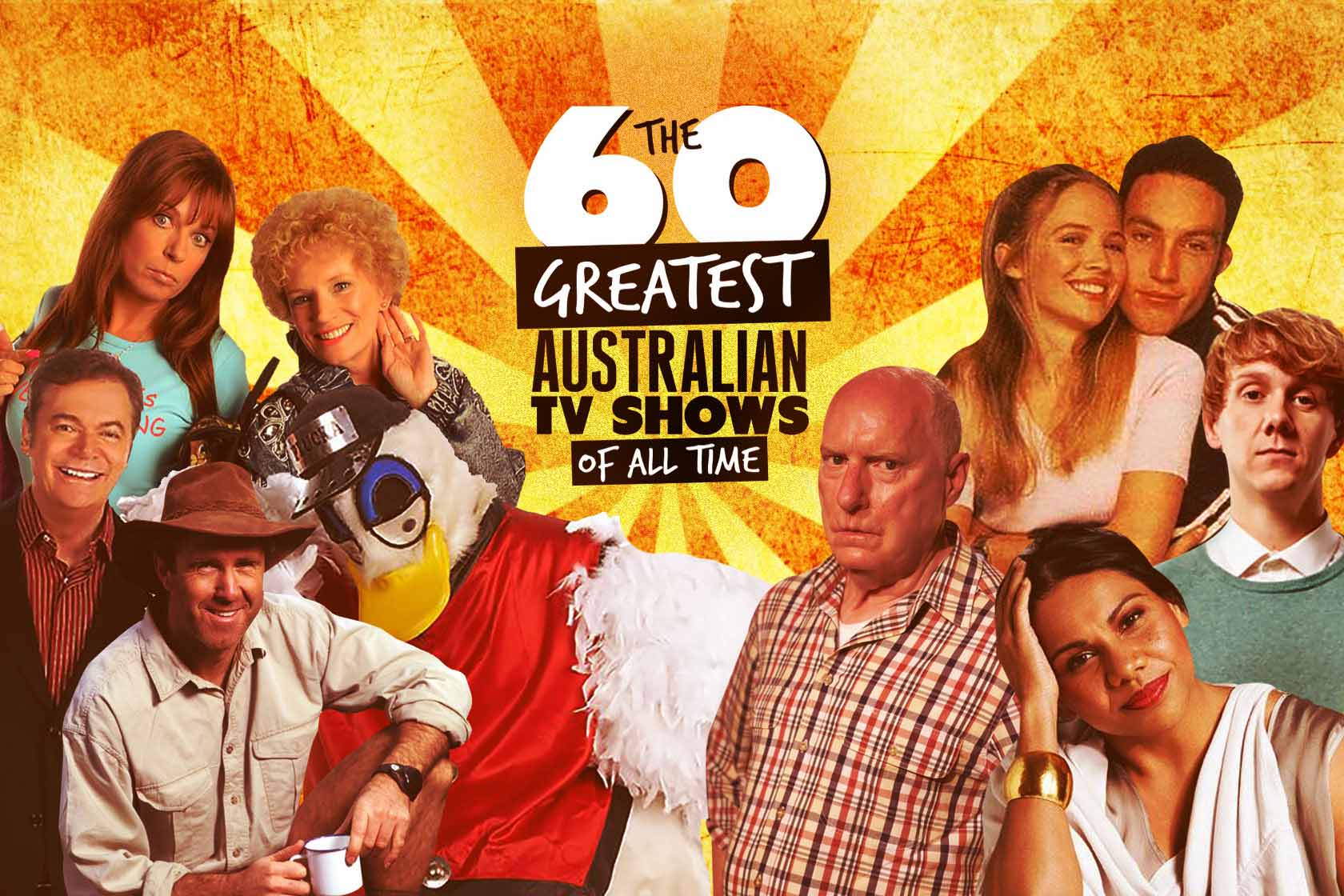The Wholly Unsurprising Story Behind Tinky Winky’s Elevation As A Gay Icon

1999 was a great year for nutjobs. Now, it’s true that most years this past decade have been too. But 1999 really kicked the season off. As the world got ready to heave six billion souls into the next millennium, mad prophets coated the airwaves with spittle and spleen, enraptured by their various manifestos of doom. Superstitions festered, paranoias spawned. Fearful of change, the crank barons of old morality gritted their teeth, locked their knees, and refused to jump forward into the 21st century.
The time was ripe for a homophobic Teletubby conspiracy.
At this point, The Teletubbies was only two years old as a program, so about the same age as its intended audience. A plumper version of The Muppets, on acid, skittles-coloured, pastoral, techno-futuristic and surreal, the kids’ show somehow got on the radar of evangelical Southern Baptist pastor Jerry Falwell.
The evidence for sexual perversion was indisputable.
The christofascist took one look at Tinky Winky on morning TV and saw the face of Sodom: swaddled in a felted purple fat suit.
A debauched munchkin! he screamed. On our American screens! Beamed straight into the minds of American babes! Oh, foul British import! Oh, how the land of David Bowie covertly extends its dominion of sin!
The evidence for sexual perversion was indisputable. The Teletubby was purple, for one. That antenna stuck on its head was shaped in a triangle – a gay pride symbol. And, as if any more proof needed to be mounted, there was the red purse Tinky Winky was constantly clutching. “A magic bag”, the show’s marketers called it. Full of Satan’s magical sperm, no doubt.
Falwell felt bilious. So, he decided to yank Tinky Winky from his alleged closet and out him in the National Liberty Journal – a promotional rag for the university he founded. (Side note: Liberty University is today one of the largest Christian universities in the world. It’s run by his son, a diehard Trump supporter).
The article was unsigned, but it didn’t matter. Everyone knew he was behind it. Falwell had made a name for himself as an anti-gay crusader: he preached that AIDS was God’s punishment for society’s tilt towards tolerance, and said things like “gay folks would just as soon as kill you as look at you” (they’re all like Cyclops from X-Men, yeah?). Memorably, he called the talk show host “Ellen Degenerate” after she came out. Oh and he would also go on to blame 9/11 on homosexuals “and the pagans, and the abortionists, and the feminists”. Christopher Hitchens called him “a little toad”.
When Falwell’s story was picked up by the network broadcasters, many scoffed, others sniggered. His followers made the sign of the cross and dreamed about burning all Teletubbies at the stake.
“He’s not gay. He’s not straight. He’s just a character in a children’s series.”
With an irony that now looks as inevitable as it does sweet, progressives took his condemnation as a cue and embraced TW as a gay icon. In March that year, The Dallas Morning News reported adults were clearing shelves of the doll. (In 2000, Teletubbies merch would reach US$1.6 billion in sales.) “Jerry Falwell has become the spokesperson of the 90s,” marvelled a marketer from Atlanta. “He can sell anything.”
Regular street stores got some skin in the game too – probably as a profit-making ‘morality marketing’ play, but probably also for the chance to build some social progress momentum through solidarity and be cheeky at the same time. At least one hair salon announced they were “Tiny Winky Friendly”. In Berkley, the purple dumpling was invited to lead a parade.
“And at an Afterwords cafe in a gay area of the nation’s capital, you can eat ‘Tinky Winky Ravioli’,” wrote the Dallas Morning News. “The menu promises “cheese-filled purple triangle pasta ‘purses’ – oops we meant ‘magic bags’.”
Falwell stewed. The show’s makers were uneasy. “He’s not gay. He’s not straight. He’s just a character in a children’s series,” said a representative of US licenser Itsy Bitsy Entertainment Co.
Tinky Winky Is Definitely A Gay Icon. Isn’t He?
Today, is Tinky Winky still a gay icon? Not so much. Newer, less cutie-pie ones like The Babadook seem to have taken his place. I can affirm that TW porn does exist. Twinky Winky Shower Twerk is one example. Measuring My Twinky Winky. And so on.
Not that this proves anything. What vaguely humanoid pop culture product hasn’t been fucked up the arse in a video online? On gay and straight channels alike, too.
But who’s to say these weird dumpy alien fuzzies share humans’ system of norms anyway? Maybe in their universe (because it’s clearly not ours), carrying a purse is the equivalent of owning a Big Truck and wearing steel-capped boots. Maybe gender doesn’t exist, or sex. Maybe the Teletubbies are not toddlers at all, but wise ancient beings without any reproductive organs.
Maybe at the end of each day, the four creatures reach the end of their life cycle, die and are cremated in the Tubbytronic Superdome, while four fresh clones are fed out like hotdogs from those weird Noo-Noo periscopic things that curl out of the ground. Who’s to say.
And who has the ‘authority’ to, anyway? If a producer announces a character is gay when this is never explicit in the content, does it make it so? Same goes for if an actor does. Or a writer. Or an audience. It’s moot.
Define “explicit”, too – especially given how many mainstream films and TV shows are notoriously hedged when it comes to non-normative representations. “I’m tired of another coy post-production admission of something still deemed far too risqué to actually show on screen,” wrote Benjamin Lee for The Guardian after Star Wars’ Lando Calrissian was ‘outed’ as pansexual.
Even if Tinky Winky did openly and explicitly identify as gay, this doesn’t mean the character is fisting Dipsy Wipsy behind a grassy knoll.
On the other hand, it’s not quite fair that queer characters have to ‘prove’ their queerness. Especially if it means devolving to stereotypes.
The case of Tinky Winky and Falwell makes for an interesting study in how cultural creators and consumers discuss, argue and assign sexuality to characters (all of which are just vessels in which our ideological wars are waged and moral anxieties spin). The fact that it was a character in a show aimed at toddlers is what makes it doubly interesting. If nothing else, and as Slate observed last year, the incident proves that in 1999, queerness in children’s programming only meant the end of the world for some. Acceptance was growing.
It also reveals a continuity in the heated conversations we’re still having today. It inflects on the debate around when and how a person’s sexuality and gender develops; the extent to which they’re informed by cultural factors, and if that’s something we should worry about; when it is appropriate to introduce ideas about how human bodies and identities are different; who has the responsibility and/or right to transmit these ideas; and the disputed territory that covers morality, sexual health and education.
The thing is this though: even if Tinky Winky did openly and explicitly identify as gay, this doesn’t mean the character is fisting Dipsy Wipsy behind a grassy knoll. Unlike heterosexuality, non-normative sexual identities are so often paired with carnality: which is one reason why Safe Schools blew off like it did.
Late last year, another felt-based children’s show echoed the Tinky Winky saga, when former Sesame Street writer Mark Saltzman said Bert and Ernie were “a loving couple”. While this had long been speculated among adult fans, the show was quick to deny the claim.
“Even though they are identified as male characters and possess many human traits and characteristics (as most Sesame Street Muppets do), they remain puppets and do not have a sexual orientation,” read Sesame Workshop’s statement.
Oh, and so Miss Piggy isn’t a raging hot mess for Kermit? retorted Twitter.
The ‘TW is a gay propaganda symbol’ debate still hasn’t settled down entirely, either. In 2007, the Polish government’s Ombudsman for Children announced she was launching an investigation into the matter. “Poland to probe whether Teletubbies are gay” ran the headlines.
Even her own conservative party laughed at her.


